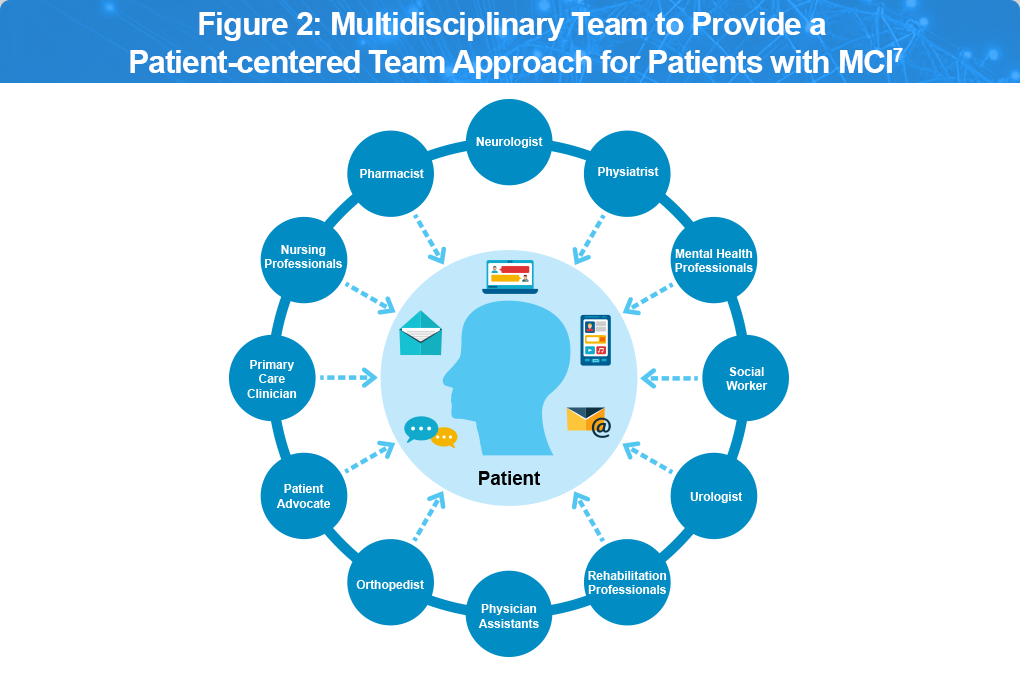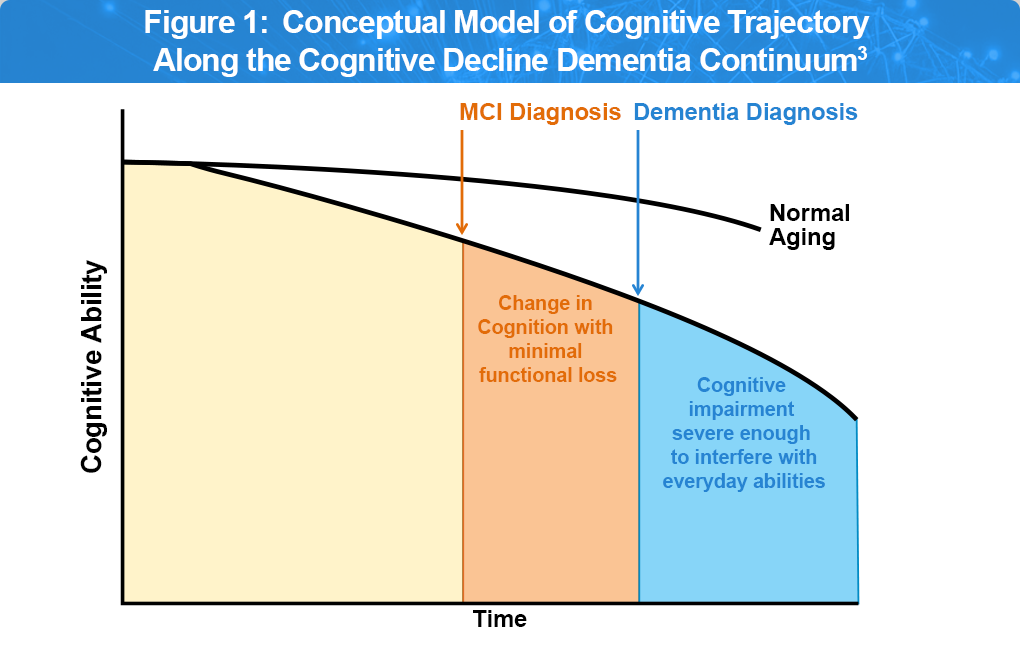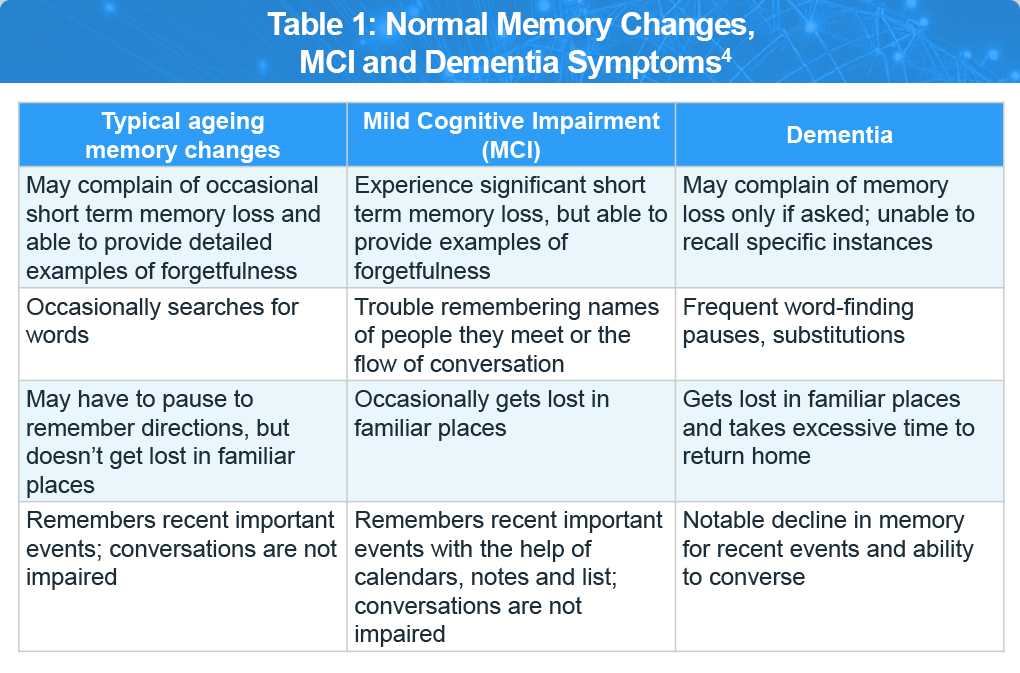Differentiating Cognitive Decline
Making the distinction between MCI and normal aging can be a challenge for clinicians.1,2 While subtle forgetfulness, such as misplacing objects and having difficulty recalling words, can be difficult for individuals as they age, it probably represents normal aging. The memory loss that occurs in those with MCI is more prominent.2 Figure 1 illustrates the cognitive trajectory. The shift away from typical aging is marked by cognitive decline that exceeds what is normally expected in older adults (green zone). A diagnosis of MCI may be considered when there is noticeable cognitive change accompanied by little to no impact on daily functioning (orange zone). If the condition progresses, a dementia diagnosis may be made when cognitive deficits become severe enough to significantly disrupt everyday activities (blue zone).3 Table 1 lists few distinguishing features between cognitive normal memory changes, MCI and dementia symptoms.4
The Role of Cognitive Screening in Clinical Practice
Cognitive screening tools can support early identification of cognitive impairment in a primary care setting. The most effective approach to early detection starts with individuals who either express concerns about their cognitive abilities—whether raised by themselves, a family member, or a healthcare provider—or those who voluntarily choose to undergo cognitive assessment.5 Cognitive screening guidelines recommends, that a cognitive screening tool, at minimum, should be able to assess memory and executive function.5 A few of the common tools include:6
- Montreal Cognitive Assessment (MoCA) and MiniMoCA
- Mini-Mental State Examination (MMSE)
- Mini-Cog
- SLUMS (St. Louis University Mental Status Exam)
- Mini Addenbrooke’s Cognitive Exam (MCE)
- General Practitioner Assessment of Cognition (GPCOG)
These tools are best used as part of a comprehensive assessment. Medicare Annual Wellness and annual physical exams are a convenient way to introduce screening to establish a baseline.6 A more comprehensive list with details is provided in the Section, “Cognitive Screening Tools”.
When to Refer: Indications for Specialist or Multidisciplinary Evaluation
Individuals identified with MCI should receive timely, comprehensive evaluations and appropriate guidance for next steps. A brief cognitive assessment can be conducted during a routine primary care visit or scheduled as a separate appointment. This assessment may be self-administered or conducted by trained healthcare staff, such as a nurse or medical technician.5 For more in-depth evaluation, multidisciplinary teams can offer neuropsychological testing, imaging, and coordinated care planning to provide a patient-centered team approach which promotes communication and optimal care (Figure 2).5,7

Summary
Differentiating normal aging from cognitive impairment is a cornerstone of geriatric care. While some degree of cognitive slowing is expected with age, significant memory loss, functional decline, and progression may indicate conditions such as MCI or dementia. Clinicians play a critical role in early detection via the use of cognitive screening tools, comprehensive clinical evaluation, and timely referral to specialists when needed. This approach enables proactive care, supports patients and caregivers, and provides the most optimal management approach.
References
- Harada CN, Natelson Love MC, Triebel KL. Normal cognitive aging. Clin Geriatr Med. 2013;29:737-752.
- Petersen RC. Clinical practice. Mild cognitive impairment. N Engl J Med. 2011;364:2227-2234.
- Powell DS, Oh ES, Lin FR, Deal JA. Hearing Impairment and Cognition in an Aging World. J Assoc Res Otolaryngol. 2021;22:387-403.
- Ambigga D, Suthahar A, Ramli A, Ng K, Radziah A, Marymol K. Diagnosis and Management of mild cognitive impairment in the community: What is the role of primary care physician?. Malays Fam Phys. 2011;6:74-78.
- Sabbagh MN, Boada M, Borson S, et al. Early detection of mild cognitive impairment (MCI) in primary care. J Prev Alzheimers Dis. 2020;7:165-170.
- Siddiqui M, Nyahoda T, Traber C, et al. Screening for cognitive impairment in primary care: Rationale and tools. Mo Med. 2023; 120:431-439.
- Newsome SD, Aliotta PJ, Bainbridge J, et al. A rramework of care in multiple sclerosis, Part 1: Updated disease classification and disease-modifying therapy use in specific circumstances. Int J MS Care. 2016;18:314-323.
Accessed on September 22, 2025.



